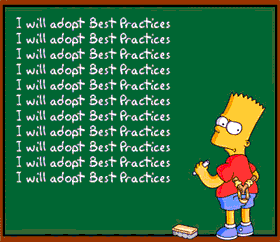When is "good enough" good enough in Information Management?
 A recent article from Image and Data Magazine offered some ideas on achieving "best practice" Information Management. The advice offered in the article is well given and it raises some important points, through the lens of a Records Management/compliance-based agenda.
A recent article from Image and Data Magazine offered some ideas on achieving "best practice" Information Management. The advice offered in the article is well given and it raises some important points, through the lens of a Records Management/compliance-based agenda.
What the article didn't ask was whether "best practice" is actually required in the first place, or whether "good enough" is good enough. What does "fit for purpose Information Management" really mean?
And of course, that got me thinking...
First off, I'd offer that unless you understand what "best
practice" really looks like, then you're not really in a position to assess how
to deliver "fit for purpose!" Conscious competence is what we're generally aiming for, and the route to achieve that will depend upon the starting competency levels within the business community (as I discussed in my post from the very start of this year.)
Another challenge is that best-practice Information
Management is a complex and inter-disciplined set of capabilities that many struggle
to fully comprehend. It therefore becomes difficult to engage with the business
community (and indeed IT teams), because they typically want immediate results,
whereas IM requires a holistic change to develop a range on foundational
competencies (see my Information Management Tube Map for a view on how these
competencies inter-relate.).
Bottom-up, localised initiatives CAN deliver value, however.
Indeed sometimes, they're the only way to achieve any progress at all. This
will often depend on cultural and societal conditions within the
organisation and in some cases, it can
actually be counter-productive to embark upon a major, centralised initiative.
(See my discussion paper on Distributed Data Quality for more on this.)
 Finally, I'm not convinced at all that a
Records/compliance-based approach is going to pay dividends either. Quite
frankly, it's boring and most business people aren't interested in discussing
risks! Seeking out new value opportunities and delivering a real business outcome will stimulate interest and engage a business community. Once there is
momentum, then you can choose which practices you want to develop, as well as establishing a level of robustness into the overall
process.
Finally, I'm not convinced at all that a
Records/compliance-based approach is going to pay dividends either. Quite
frankly, it's boring and most business people aren't interested in discussing
risks! Seeking out new value opportunities and delivering a real business outcome will stimulate interest and engage a business community. Once there is
momentum, then you can choose which practices you want to develop, as well as establishing a level of robustness into the overall
process.
Whenever he'd finish an odd-job around the house, my grandad regularly used to say, "Neat but not gaudy, as the monkey said when it painted the piano green."* When I was a child, I had not the faintest idea what the bloody hell he was on about.
Thirty five years later, I understand that he was making perfect sense all along...
*Other sources offer a slightly different usage of the phrase, amounting to the same thing. And yes, I know that's an ape, not a monkey. So sue me!
No comments:
Post a Comment